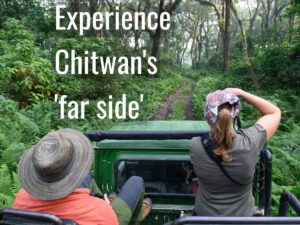Where wine was born and the local cheeses are prized: Alaverdi, Georgia
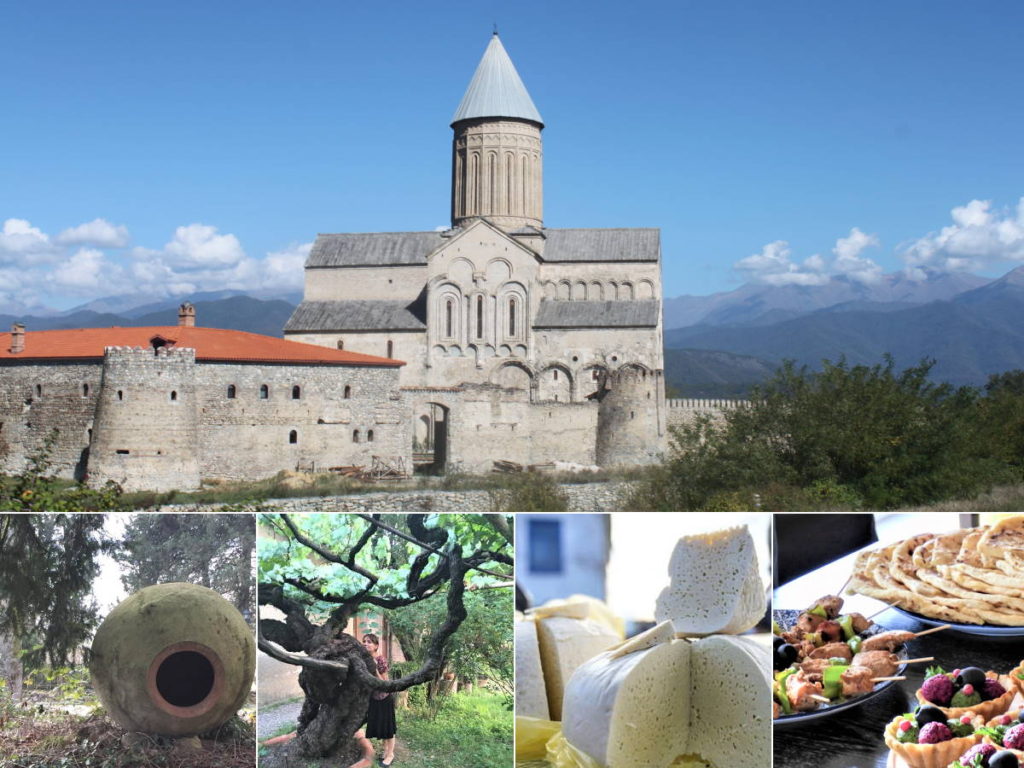
In 2017, the US’ National Academy of Sciences conclusively determined that wine originated some 8,000 years ago in Georgia.
I was already working in Georgia and was invited to visit the tiny village of Alaverdi in the heart of Georgia’s Alazani River valley, a vast winemaking area.
With a population of fewer than 200, Alaverdi is one of 14 villages in the Akhmeta district of Kakheti province.
Regardless of wine’s origin story, we, together with our strategic partner Bridge Innovation & Development, wanted to include Alaverdi in a network of rural Black Sea destinations that are dedicated to sustainable tourism; our Black Sea Sustainable Rural Tourism Program.

The inside track
Richard Shepard is the founder & trustee of Sustainable Rural Development International, which is implementing the Black Sea Sustainable Rural Tourism Program in Ukraine, Georgia, and Turkey.
The primary reason for my 2019 visit was to view the house that our partner was restoring for use as a small guest house and mini conference centre.
I was picked up from my apartment in Tbilisi in the morning and we drove north for a little over two hours through Georgian hillsides and forests, passing through small villages along the way, until the road descended into the Alazani River valley.
As we neared our destination, we passed Alaverdi Monastery, one of the oldest monasteries in Georgia and the largest cathedral outside Tbilisi.
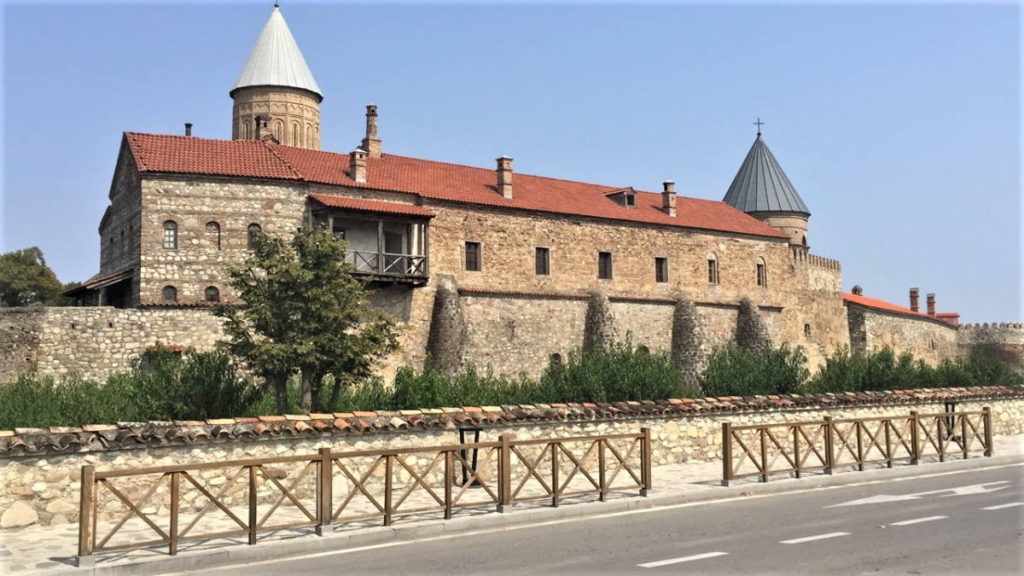
The road we followed from Tbilisi is the main route to Tusheti in the high Caucasus. Two lanes … more or less. Keep following this road for another four hours past Alaverdi and you’ll arrive at one of the most spectacular places in the Caucasus: Tusheti.
About five minutes after passing Alaverdi Monastery, we turned through a gate into the grounds of the house. Carpenters, stone masons, and electricians were busy with restoration work. It was clear that this was going to take time as the entire structure needed work to bring it up to modern accommodation standards.
Also see Richard Shepard’s contributions to The “Good Tourism” Blog
The view from the balcony of the house was of a valley of vineyards stretching to distant mountains high enough to make them seem closer than they are. The Alazani River splits Alaverdi off from its nearest neighbour, the larger village of Kvemo Alvani.
Upon arrival in Alaverdi, to stretch our legs, we walked back to the monastery where behind its high walls we wandered around well-maintained gardens. Inside the cathedral, the stone-cool air and vaulted ceilings evoked a feeling of having witnessed a thousand years of history.
Across the road, at the monastery-owned restaurant, we enjoyed a very traditional Georgian lunch paired with a truly excellent monastery wine.
The monks at this monastery have had time to perfect their wines. They’ve been fermenting grapes from the surrounding vineyards since the 11th century.
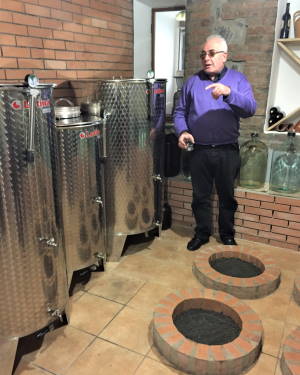
But that’s relatively recent. Georgians have been making wine for 8 millennia. The earliest evidence of wine-making in the world, circa 6,000 BC, has been found in Georgia; in fragments of the same type of giant underground ceramic urn, or qvevri, used today.
The monks of Alaverdi Monastery make some of their wine in these qvevri. To say that this is a tradition is an understatement.
Alaverdi Monastery is also a fortress. Its buttressed walls were built in the 11th century for good reason. Invasions were regular occurrences up and down the valley. The Alazani valley is a natural invasion route. Clans in modern-day Azerbaijan and Georgia frequently fought each other.
The monastery was founded some 500 years earlier, in the 6th century, by a monk from Antioch. Now, in the 21st century, its restaurant, traveller fees, and sales of wine and honey, support the place.
Earlier this year, 2022, our partner completed restoration of the house. Alaverdi Blue is open for business with modern rooms and a small yet advanced conference facility.
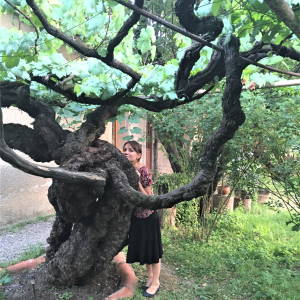
They also designed a full-day Community Experience excursion which is included in a two-night booking. Visitors get to support two non-profits and an entire community while experiencing the unique culture, ecology, and rural life of eastern Georgia.
Stay longer. Alaverdi makes a great base from which to explore the region. Launch excursions into the mountains, or wine-tastings in Telavi and Tsinandali, and then return to peace and quiet.
The local cheeses of this region are also highly prized in Georgia, so cheese lovers at least have a reason to stay a while longer.
Indeed, Alaverdi Blue’s proprietors have initiated a program to support local cheesemakers, establishing cold storage rooms and processes that they hope will deliver more income and a better standard of living to home producers, shopkeepers, and dairy farmers in the valley and the mountains.
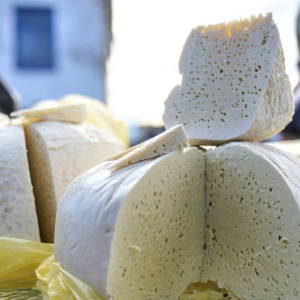
If you are truly adventurous and heading overland from Tbilisi to Tusheti — a long drive that includes some truly startling switch-back mountain roads — Alaverdi is a great place to break up the trip.
For many, Georgia is ‘undiscovered’. Its natural settings, welcoming people, and amazing cuisine make it a destination that everyone should put on their bucket list.
Welcome to Georgia!
Where is this?
The pin representing this “GT” Travel Experience on the “GT” Travel map below points to Alaverdi Blue, which is part of the Black Sea Sustainable Rural Tourism Program and is available for booking.
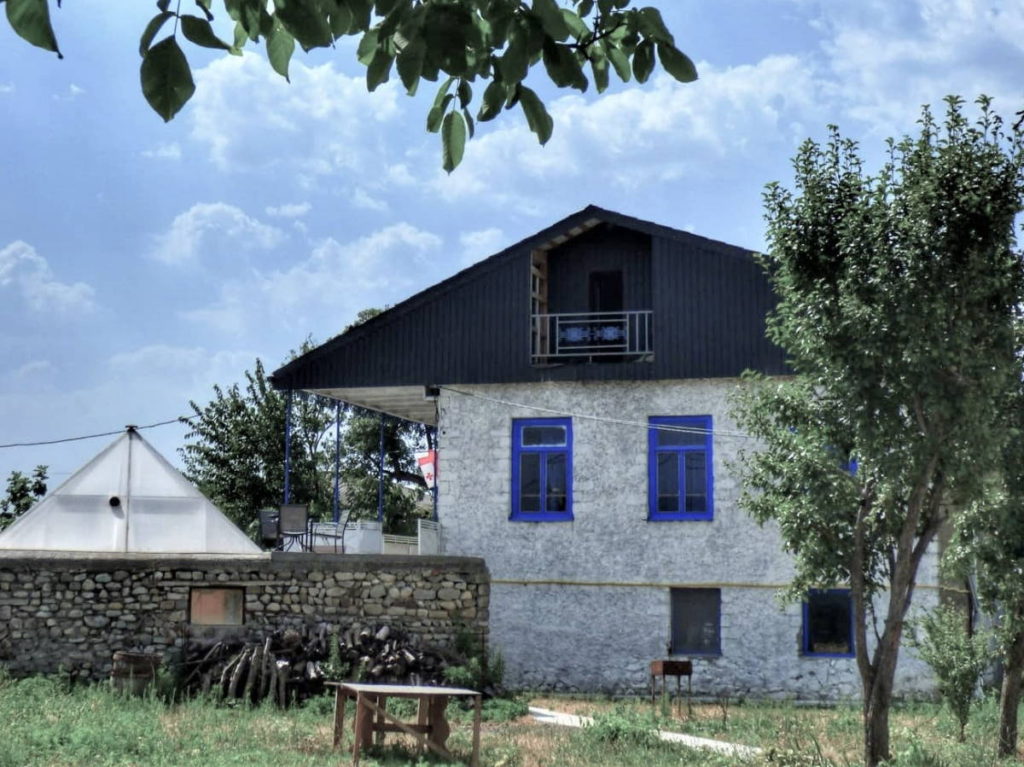
The BSST Program is operated by Sustainable Rural Development International Limited, a UK non-profit social venture for which Richard Shepard is the Senior Trustee.
Alaverdi Blue is owned and operated by Bridge Innovation & Development, a Georgian non-profit, strategic partner of SRDI, and the National Office of the BSST Program.
Featured image (top of post): All images © Richard Shepard.




